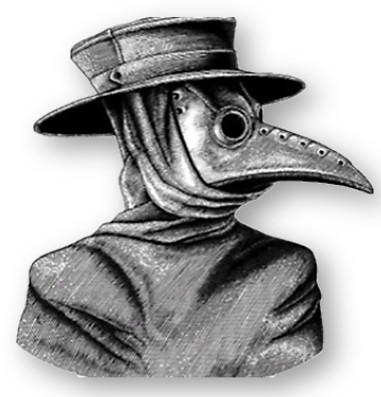Kibworth and the Black Death

As part of Kibworth Community Library’s Local History Season, a talk was given about the Black Death and how it impacted Kibworth.
The Black Death was a devastating plague that killed hundreds of millions of people in the 14th century. In England, up to 3 million people died and Kibworth suffered a 70% death rate, the highest recorded in any village throughout the country.
Records kept in the 14th century were not an accurate reflection of what happened. Only landlords and tenants’ deaths were recorded. Those of their wives, children, men who were labourers and the landless weren’t recorded.
Local People
We do know the names of some of the people who died here. John Sibil was the vicar early on in the plague. He and his sister Constance who also died, would have been involved in visiting the sick and giving comfort. Like the nurses and carers during Covid, those were the people most likely to catch the disease. Across England 50% of vicars died and Kibworth had 3 vicars during the period of the Black Death from 1346 to 1353.
Others listed were Mr Heynes – village clerk for two decades, Alice Carter, John Church Senior – once Reeve of the village, the person who oversaw village custom and practice, who organised the agriculture, exacted fines, and submitted the accounts to Merton College.
The Polle’s
The Polle’s were one of the oldest families in the village, here since at least the 1100s. There were four separate Polle households in the 13th century. Agnes, Rob and Nicholas Polle are recorded as having died in 1349.
John Polle was the Reeve during the Great Famine in the early 1300s. He would have been elected to the role by the villagers. His son Roger became Constable of the village in 1326 and 2 years later became Reeve. He stood down in 1348 after being accused of maladministration. Will Polle was the curate at the time of the Black Death.
Roger Polle lived a relatively long life, he died in 1369 after having survived the Great Famine, which occurred a few years before the plague, and the Black Death. His three sons, Robert, William and Nicholas also survived. Their family is recorded as living in Kibworth until the 1700s when the male line ended. The house that one branch of the family lived in during 1516 still stands in Kibworth Harcourt and was the home to the Constable or the Bailiff during the 15th and 16th centuries.
Interested to hear more
This talk has been given twice as it has proved to be extremely popular. It also covered the history and pathology of the disease itself. If you would be interested in hearing it, please let them know in the library and if there are enough people wanting to attend we will run it again.
Julie Harrison
Kibworth Village webpage, The Great Famine and the Black Death




 Beryl Tory: The Full Eulogy
Beryl Tory: The Full Eulogy

